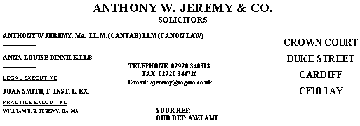Canon Law
Dear Sir,
We have been asked from time to time for advice on the Canonical position of Roman Catholics who face hostility from their Parish priests or Bishops to the teachings and writing of Vassula Ryden, the Greek Orthodox Visionary.
The material facts are that the Church has never pronounced Vassula’s writings to be against the teachings of the Church. In his public statements the Prefect of the Congregation for Faith and Doctrine (Cardinal Ratzinger) has carefully avoided saying that there is heresy or error in the messages of Vassula. Far from criticising her teaching, the Cardinal told the Brazilian Bishops, for example, that they were to continue to promote Vassula’s writings with discernment. He has also said that the faithful should continue to view her writings with a prudent eye, maintaining a discerning attitude. In 1998, the Holy Father when given her latest book said, “May God Bless Her”. The central theme of Vassula’s messages (the recovery of Unity between Christians) reinforces the untiring efforts of Pope John Paul II towards Christian Unity.
The relevant povisions of the Canon Law are as follows: –
(i) The duty to seek the truth – One of the most remarkable documents of Vatican II was the Declaration on Religious Freedom (Dignitatis Humanae). The following passage appears in paragraph 2:
“It is in accordance with their dignity as persons – that is being endowed with reason and free will and therefore privilege to bear personal responsibility – that all men should be at once impelled by nature and also bound by a moral obligation to seek the truth, especially religious truth. They are also bound to adhere to the truth, once it is known and to order their whole lives in accordance with the demands of truth”.
And in paragraph 3:
“Hence everyman has the duty and therefore the right to seek the truth in matters religious in order that he may with prudence form for himself right and true judgements of conscience, with the use of all suitable means”.
These principles inspired Canon 748 which obliges all persons to seek the truth and once having perceived it to accept the obligation imposed by divine law to observe it. The Canon goes on to entrench conscience and immunity from coercion in regard to the Catholic Faith. It is widely accepted that this Canon enshrines the stance of the Declaration on Religious Freedom and legitimised the notion that Revealed Truth is a developing concept, not something, which is held by the Magisterium in a fixed state.
(ii) The rights of the Faithful – It is a fundamental theological truth expressed in the juridical language of Canon 204 that all of the Christian Faithful incorporated in Christ through Baptism are involved in the mission of the Church, sharing in Christ’s priestly, prophetic and royal offices in their own manner. Following Vatican II (Lumen Gentium par 10) this Law reverses the old impression that only the hierarchy is entrusted with the mission of Christ and the Code of Canon Law clearly sets out the role of all Christians in the mission of the Church particularly that of lay persons.
(iii) The right to express an opinion – Whilst the Christian Faithful must follow the teaching of the faith as determined by leaders of the Church (Canon 212.1) they are given a specific right and even at times a duty to make known their opinion on matters pertaining to the good of the Church to their Bishops and to other Christian Faithful (Canon 212.3) and the Code of Canon Law proclaims that the Church is to safeguard and expound revealed truth, and to preach the gospel, but again following the Second Vatican council (Lumen Gentium paras 12, 31, 35) it is all of the people of God who share in the prophetic and teaching office of Christ, not only the hierarchy or the Clergy (Canon 747)
(iv) The Ecumenical Duty – Canon 755 acknowledges that the Church is bound by the will of Christ (the strongest mandate known to Christians) to promote unity. The College of Bishops and the Holy See are to direct the participation of Catholics in the Ecumenical Movement and the Bishops are to do the same in the Churches entrusted to them. This Canon which of course is routed in a Second Vatican Council Paper (Decree on Ecumenism) is cast in very positive terms “to promote.. the ecumenical movement, whose purpose is the restoration of unity among all Christians”. It urges in the second part the local Bishops to promote Christian unity and to establish guidelines for action to that purpose. Given that this is the unity for which Christ Himself prayed (the Gospel of John Chapter 17) it is hard to underestimate the importance of these canonical duties.
It follows that Clergy should not attempt to fetter members of the Catholic Faithful from performing the duty to seek the truth, bearing in mind that Ecclesiastical approval is not required for them to attend Vassula’s meetings (she is after all a Greek Orthodox). They should not undermine the rights of Lay people to give their opinion on matters of importance affecting the Church and their Canonical right to be involved in the Mission of the Church. Indeed they have a duty to assist in the promotion of Christian Unity, as enjoined by Christ Himself, and set forth in the clearest terms in Canon 755.
Yours faithfully,
ANTHONY W JEREMY



